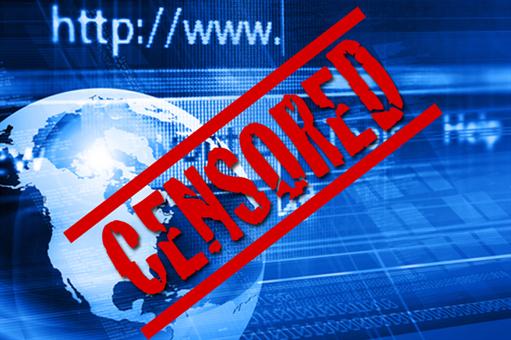Legislation to make it illegal to use “offensive” language online
Steve Watson
Infowars.com
April 2, 2012
Infowars.com
April 2, 2012

The state legislature of Arizona has passed a bill that vastly broadens telephone harassment laws and applies them to the Internet and other means of electronic communication.
The law, which is being pushed under the guise of an anti-bullying campaign, would mean that anything communicated or published online that was deemed to be “offensive” by the state, including editorials, illustrations, and even satire could be criminally punished.
The Comic Book Legal Defense Fund breaks down Arizona House Bill 2549:
“The bill is sweepingly broad, and would make it a crime to communicate via electronic means speech that is intended to ‘annoy,’ ‘offend,’ ‘harass’ or ‘terrify,’ as well as certain sexual speech. Because the bill is not limited to one-to-one communications, H.B. 2549 would apply to the Internet as a whole, thus criminalizing all manner of writing, cartoons, and other protected material the state finds offensive or annoying.”
First Amendment activist group Media Coalition has written to Arizona Governor Jan Brewer, urging her not to sign the legislation into law.
The letter notes that the terms used in the bill are not defined in the statute or by reference, and thereby the law could be broadly applied to almost any statement.(Story continues below...)
We are in a dire situation in this country today, and small publications like this one do not have the huge resources of George Soros pouring in like our liberal friends.
Worth Reading is not funded by the government like NPR.
Worth Reading is not funded by the government like PBS.
Please become a supporting member and help fund this ongoing effort to provide you with news and commentary relevant to our divided nation.
Help us get back our simple conservative values. Remember, the Bigger the Government - the Smaller the citizen!
“H.B. 2549 would make it a crime to use any electronic or digital device to communicate using obscene, lewd or profane language or to suggest a lewd or lascivious act if done with intent to ‘annoy,’ ‘offend,’ ‘harass’ or ‘terrify,’” the letter notes. … ‘Lewd’ and ‘profane’ are not defined in the statute or by reference. ‘Lewd’ is generally understood to mean lusty or sexual in nature and ‘profane’ is generally defined as disrespectful or irreverent about religion or religious practices.”
“H.B. 2549 is not limited to a one to one conversation between two specific people. The communication does not need to be repetitive or even unwanted. There is no requirement that the recipient or subject of the speech actually feel offended, annoyed or scared. Nor does the legislation make clear that the communication must be intended to offend or annoy the reader, the subject or even any specific person.” the letter continues.
In this respect the law could even technically be applied to someone posting a status update on Facebook.
“Speech protected by the First Amendment is often intended to offend, annoy or scare but could be prosecuted under this law.”The Media Coalition letter continues.
“A Danish newspaper posted pictures of Muhammad that were intended to be offensive to make a point about religious tolerance. If a Muslim in Arizona considers the images profane and is offended, the paper could be prosecuted. Some Arizona residents may consider Rush Limbaugh’s recent comments about a Georgetown law student lewd. He could be prosecuted if he intended his comments to be offensive. Similarly, much general content available in the media uses racy or profane language and is intended to offend, annoy or even terrify.”
“Bill Maher’s stand up routines and Jon Stewart’s nightly comedy program, Ann Coulter’s books criticizing liberals and Christopher Hitchens’ expressions of his disdain for religion, Stephen King’s novels or the Halloween films all could be subject to this legislation. Even common taunting about sports between rival fans done online is frequently meant to offend or annoy, and is often done using salty and profane language.”
This type of legislation is far from unprecedented. Last year, former president Bill Clinton proposed a law to censor internet speech. “It would be a legitimate thing to do,” Clinton said in an interview that aired on CNBC. Clinton suggested the government should set-up an agency that monitors all media speech for supposed factual errors.
“That is, it would be like, I don’t know, National Public Radio or BBC or something like that, except it would have to be really independent and they would not express opinions, and their mandate would be narrowly confined to identifying relevant factual errors” he said. “And also, they would also have to have citations so that they could be checked in case they made a mistake. Somebody needs to be doing it, and maybe it’s a worthy expenditure of taxpayer money.”
Cass Sunstein, head the Office of Information and Regulatory Affairs, has also proposed banning speech on the internet that the government disagrees with. Sunstein proposed the creation of an internet “Fairness Doctrine” similar to the one that was used for years to limit and eliminate free speech on the radio.
This legislation represents yet another move to police and control freedom of expression via the internet. Once again it grants the state and the government the direct right to determine what is and is not “offensive” on a whim. It then allows for the prosecution of individuals and organisations based on such summations – an extremely dangerous precedent to set.
—————————————————————-
Steve Watson is the London based writer and editor for Alex Jones’ Infowars.net, andPrisonplanet.com. He has a Masters Degree in International Relations from the School of Politics at The University of Nottingham in England.
